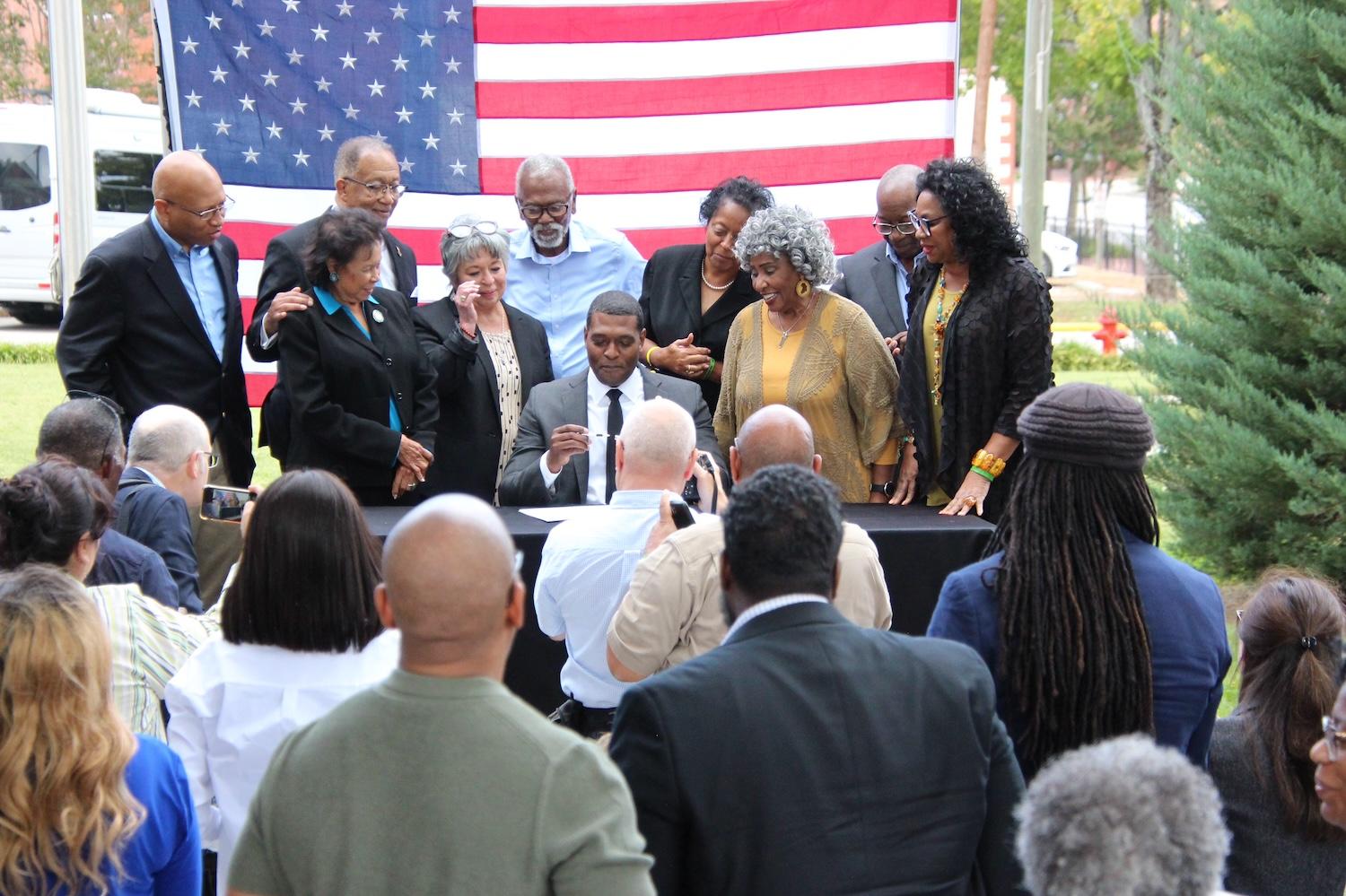
The U.S. EPA announces the new Department of Environmental Justice and External Civil Rights in Warren County, North Carolina, in 2022.
In September 2022, I was one of the few young people to join the U.S. Environmental Protection Agency (EPA) for its announcement of a new national Office of Environmental Justice and External Civil Rights. The event — symbolically hosted in Warren County, North Carolina, the birthplace of the Environmental Justice movement — was filled with the pioneers and originators of environmental justice both within and outside of U.S. government. These individuals were seeing codified for the first time a commitment by their federal government to protect the historically marginalized communities they’d been advocating for over the last 40 years.
Only a month prior, the Inflation Reduction Act (IRA) had been signed into law, representing the last in a slew of legislation that committed to investing in aging roads and buildings, as well as clean soil, water, and air. It was an unmatched feeling seeing bright-eyed hope from these longtime activists, heroes, and dreamers: hope for a better, more equitable future now backed by federal policy.
It's difficult to believe that less than three years after this historic announcement, the promises of these legislative victories, and the programs they launched, are being dismantled.
In the past six months, the Donald Trump administration has made staff, program, and budget cuts that leave rural, coastal, and frontline communities vulnerable. The new EPA has also announced the termination of nearly 800 grants, the majority of which were earmarked for community development, air and water quality testing, and remediation efforts in low-income and disadvantaged communities. Congress passed a budget bill that not only represents the largest transfer of wealth from low-income Americans to the ultra-wealthy, but also allows the fossil fuel industry a pass to pollute, guts funding for air monitoring, and cuts incentives that would improve access to clean energy for the most vulnerable communities. Just last week, the EPA announced its intent to scrap the Endangerment Finding, which compels the agency to take action to reduce the emission of greenhouse gases, further inhibiting the government's ability to combat climate change.
The uncertainty and chaos stirred by the indiscriminate and illegal freezing of funds and the passage of the budget bill had ripple effects across the country. Groups like Climate United, the organization I joined with a vision of bringing long overdue capital for clean energy to some of our most neglected communities, have been at a standstill for months. Our funds, like so many other organizations, sit in limbo despite orders from a district court judge to release the money.
The current administration claims that these cuts and freezes will save taxpayers millions of dollars. But with ever-rising insurance rates, 8 percent year-over-year energy bill increases, $820 billion in climate-caused medical costs per year, and roughly $150 billion annually in damage from unprecedented extreme weather events, taxpayers can expect to lose more money than ever before. Further, these targeted funding freezes, grant terminations, and repeals represent a larger effort to turn words like environmental justice, which only a few months ago represented proactivity and fairness, into something dirty.
Environmental justice is about investing in the disinvested.
Environmental justice is not just a buzzword, and it’s about much more than environmental remediation. Environmental justice is about making sure no one in this country develops asthma, heart disease, or cancer because of who they are or what ZIP code they live in. It’s about ensuring children aren’t dying of lead poisoning in Flint, Michigan; that low-income individuals in Texas, West Virginia, New York, and North Carolina aren’t seeing their houses washed away by 1,000-year storms; that the elderly in Georgia, Mississippi, and Alabama aren’t dying from heat stroke during ever-hotter summers; and that every American has the ability to buy a home, raise a healthy family, and live a full life without threat of toxic chemicals being dumped in their backyard.
It’s often difficult to see the day-to-day impacts of the federal grants and programs that the previous administration established, but this money was fueling the type of bootstrap work and innovation that this country runs on.
For example, in Louisiana’s infamous Cancer Alley, grassroots advocacy has spurred long-awaited federal investment to address environmental harm along the heavily-polluted stretch of the Mississippi River between Baton Rouge and New Orleans. Community leaders and grassroots organizations like the Bucket Brigade and Rise St. James have been fighting against pollution for years, staging protests, leading educational campaigns, and collecting tens of thousands of public comments. The persistence of local communities has helped stop the construction of additional industrial facilities and garner federal investment, including $500,000 from the EPA for air quality monitoring, among other programs. These fights, spearheaded by former schoolteachers, business owners and everyday citizens, have not only called attention to the disparate harm of fossil fuels in underserved communities, but also helped galvanize the Joe Biden administration’s massive investment in renewable energy programs.
Over the last four years, innovative programs like the National Clean Investment Fund and Community Change Grants were created to leverage public and private capital to strengthen local economies, reduce pollution, and save money for hardworking Americans.
Grassroots organizations like Young, Gifted, and Green — which championed legislation and advocated for millions in EPA grants to reduce lead-exposure in schools across Washington D.C., Michigan, and Tennessee — planned to use these grant funds to expand their advocacy by creating an Environmental Justice Workforce and Education Center to equip residents in and around Memphis’s fossil fuel industrial hub to participate in public health and clean energy opportunities. Native Tribes from Alaska, to Oklahoma, to Minneapolis and more are counting on National Clean Investment Fund dollars to go solar, decarbonize their health systems, and reduce their reliance on expensive diesel fuel.
Using federal dollars to invest in the poor and improving people’s access to life-saving clean energy, healthy food, and resilient infrastructure isn’t just a moral mandate. These dollars help ensure every American has what they need to realize the American Dream for themselves. Communities disproportionately impacted by pollution get clean-ups, better schools, access to cheap energy, and construction of healthcare facilities where previously none existed. Families who lost their homes to floods in Appalachia can repair and rebuild. Low-income households can finally afford to purchase energy-efficient appliances, weatherize their homes, and go solar to lower their energy bills.
To yank money away from the most vulnerable, impoverished and polluted communities means that the current administration is giving up on one of its most critical directives: to make America great.
I joined Climate United because despite the uncertainty, I wanted to push forward the legacy — the dreams — of those hope-filled advocates who spent the last four decades putting their blood, sweat, and tears into making this country a better place to live.
While it’s tempting to stay quiet as these recent, unforgiving cuts impact the wellbeing of our communities, we can’t give up. We owe it to the people we represent, and for whom federal grants and programs are a lifeline, to defend these programs.
Whether you’re a long-time organizer fighting to keep your Community Change Grant; a banker or clean energy developer looking to leverage tax credits, EPA programs, or other federal funds to build community wealth; or someone new to this work entirely, it’s time to make some noise. Together, we can tell this administration that we’re not giving up on making this country a cleaner, healthier, more prosperous, and resilient place for everyone.

Cameron Oglesby is the Senior Officer for Rural Outreach at Climate United, focused on connecting rural and low-income disadvantaged communities to economic opportunity through clean energy investment. She is an internationally awarded environmental justice organizer and solutions journalist with experience in sustainability and public sector management consulting. Her reporting has appeared in The Nation, Grist, Environmental Health News, and Yale Climate Connections among others.














